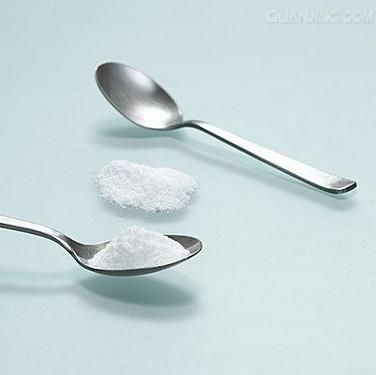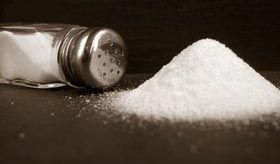We often look at some consulting programs. We can often see some new mothers asking questions about how much baby can eat salt. This issue is very realistic and very important. Salt is the most important seasoning in our daily life. Then, when should the baby eat salt? How should mothers use some other foods to add a "taste" to their baby's diet? The baby should not put salt in his food supplement when he is younger than 1 year old because it may harm his kidneys. The baby needs less than 1 gram of salt a day for the first 6 months, usually from breast milk or formula milk. Between 7 and 12 months, your baby's salt will increase slightly to about 1 gram. Children aged 1 to 3 need less than 2 grams of salt per day (equivalent to 0.8 grams of sodium per day). Give your baby salt to remind Baby's natural salt intake from breast milk and milk can already meet the needs of the body. Do not add salt to the baby's vegetable water. The whole family mobilizes and eats light food. Children's tastes are related to parents, parents' tastes are heavy, and the salt content of children's diet will also increase. It is understood that at present, the salt content of the family in our country is generally excessive. When parents prepare meals for their children, they must pay attention to reducing the composition of salt. After the baby is 1 year old, it can be properly eaten with iodized salt, when cooking or when making soup, wait until it is cooked or put salt in the pan. This works better. If your baby suffers from diseases such as heart disease, nephritis, and respiratory infections, you must strictly control the salt intake in your diet. You can use the method of adding salt at mealtimes, that is, add less salt when the dishes are cooked, or salt when the dishes are cooked without salt. This will cause the salt to adhere only to the surface of the dish, leaving only a bit of salt but it will taste like it. When the baby sweats more in summer, or when the baby has diarrhea or vomiting, the baby's salt intake may increase slightly compared to usual. Should pay attention to the baby to supplement from the diet. The South likes to eat ume dried vegetables, salted fish and bacon, etc. These foods are generally high in sodium, and babies should try to avoid them. In addition, bean paste, chili sauce, mustard, sauerkraut, cucumber sauce, yellow sauce, miso, fermented bean curd, salted duck eggs, etc. should also be avoided as far as possible for the baby. The daily diet in the North is mostly salty and can be properly improved in taste and replaced with sweet and sour instead of salty. For example, the use of sucrose to cook sweet and sour flavor dishes, or vinegar with cold dishes, can make up for the lack of salty taste, but also promote appetite. When you taste the baby's finished complementary food, you will feel a bit unpalatable and tasteless, but this is in line with your baby's taste. Your weight will be several times that of your baby's weight. Don't judge your baby's taste with your standards. . If you eat properly, your baby will eat salty. In addition to knowing how much your baby can eat salt, to follow these recommendations for salt, you should pay attention to: • Limit your baby's salty foods • Do not add salt to baby food • Limit processed foods such as semi-finished products, snacks, biscuits, soups, broths, sushi, pizzas, canned vegetables, cheese, sausages, potato chips and other high salt foods to low salt foods Specially produced foods for babies have very low salt content, such as canned food supplements and baby cereals, because no salt is added during the production process. When buying such foods, you should pay attention to the age of the baby on the package, because the foods prepared for the older children are all finely processed and have a high salt content and are not suitable for your baby. Five major hazards of high salt diet for your baby 1. A high-salt diet can reduce the secretion of saliva from the oral cavity and reduce lysozyme, which is beneficial to the presence of various bacteria and viruses in the upper respiratory tract. 2. After the high-salt diet, due to the infiltration of salt, it can kill the normal parasitic flora of the upper respiratory tract, causing dysbacteriosis and leading to morbidity. 3, high-salt diet can inhibit the proliferation of oral mucosal epithelial cells to make them lose disease resistance. 4. High-salt diets can affect the absorption of zinc in children and cause zinc deficiency in children. 5, high salt diet will increase the baby's heart, kidney burden. The baby's kidneys are not yet fully developed and are not enough to penetrate too much salt. If too much salt is added to the complementary food, it will increase the baby's kidney burden and increase the burden on the heart, thereby impairing the function of the kidney and heart. Moreover, the dietary habit of cultivating heavy salt from an early age is not easy to correct after growing up, and heavy salt eating habits can easily cause diseases such as high blood pressure. Mommy borrows little tricks Soup with soy sauce My baby was 10 months old. Every time I made a noodle soup, I cooked it with clear water and put some green vegetables. But I was always worried that there was no taste, so I put a few drops of soy sauce in the soup. It's more fun. Egg tarts on the skin Every time I steamed egg tarts, I always put some chopped shrimps in it. With shrimp, egg tarts have a unique flavor that makes them more delicious. Make a variety of flavored porridge After my baby can eat the complementary food, I often porridge to her, but I find that white porridge does not eat as much as she likes, but also, adults don't like to eat it even if they don't taste it! How to do it? Or think of a way! There were several sweet potatoes in my family. When I ate the porridge again, I cut the sweet potatoes in it. The soft sweet potato porridge made the baby's appetite open. She ate the next half of the bowl! Later I used pumpkin to make porridge. The baby also I love to eat. Later, I also put the cheese slices into the porridge, so that all kinds of flavored porridge baby can eat it! Due to people's concerns about health, plant products from natural sources have also received widespread attention. Natural plant tea cuts are products made by direct shearing, crushing, and other physical processing of pure plants. The product retains all the original characteristics of the plant, and the properties of the product are better packaged and can be easily transported to different places. Organic Plant Slice,Plant Cut,Plant Tbc,Angelica Root Slice Amazy Organic Biotech Co.,Ltd , https://www.amazyorganic.com

At the same time, the active ingredients of the product are not damaged. It is widely used in functional tea and other fields. Common products are: astragalus cut, burdock cut,etc.